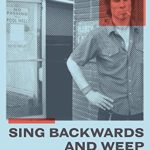Mark Lanegan’s harrowing new memoir, Sing Backward and Weep begins, like so many books, with a flashback.
In it, Lanegan has just copped heroin and coke and gets popped by Seattle’s finest. Turns out they were looking for an auto-theft suspect and Lanegan, who has no ID but gives his real name, is mercifully and miraculously sent on his way.
“Didn’t you used to be a singer?” the cop says.
Lanegan is at one of his many low points here. But this opening tale, like others in his book – a weird party for four with a guy who may or may not have been Anthony Kiedis’ father, for instance – is never revisited and doesn’t seem to have a point.
But Sing Backward and Weep, which follows Lanegan from childhood in Ellensburg, Wash., to his ringside seat to the burgeoning Seattle scene as singer for Screaming Trees to the deaths of friends both famous – Kurt Cobain, Kristen Pfaff – and not – a fellow crackhead named Shadow, a victim of a serial killer – to his own successful rehab with big assists from Courtney Love and Duff McKagen, certainly does. That is, it’s never too late to get your shit together, even if you’ve thrown away everything multiple times in pursuit of alcohol, crack and smack.
Writing the book also inspired a new, companion LP, Straight Songs of Sorrow.
Lanegan’s nonstop tales of blackout drunkenness, stupor-inducing heroin usage, days-on-end crack binges, sex and masturbation – why do musicians always write about jacking off? – would quickly grow tiresome some of not for his obvious self-awareness and strong writing with the help of editor Mishka Shubaly. The long-sober Lanegan isn’t spouting 12-step platitudes; he’s writing as a man who knew at the depth of his lows – and knows now – every nook and cranny of his inner darkness and weakness. This is the insight that makes “Sing Backwards” such an engrossing – and validating – read at a generous 352 pages.
Toward the end of the book, when scoring heroin is all that matters in a never-ending quest to stave off dopesickness, Lanegan has an epiphany as he savagely pummels a would-be dealer in Amsterdam who tries a late-night ripoff.
“As I persisted in the unrelenting beating, I became aware of a dull, cemetery-dead emptiness inside,” he writes.
“I had stopped feeling anything at all. No rage, sadness, fear, nothing. I had finally crossed the line and ceased to give a damn about life, death or any other meaningless thing in between.”
Although he’s hardest on himself, Lanegan is also pretty nasty to the Trees’ Conner brothers – guitarist Lee and bassist Van – to the point of making the reader think enough already. But his rap on Liam Gallagher is hilarious; his friendships with Cobain and Layne Staley – whose 2002 death closes the book – are heartwarming; and his salvation is hopeful.
Ending as it does so long ago, Sing Backwards and Weep all but ignores Lanegan’s solo career, save for his first two solo LPs – the Winding Sheet and Whiskey for the Holy Ghost – and doesn’t explore his path to prolonged sobriety and productivity.
This is a huge disappointment for fans of his post-Trees work. But what’s there is entertaining, engaging and eye-opening.
And despite its bleak subject matter, Sing Backwards and Weep is ultimately, and unbelievably, a glimmer of hope in a world ravaged by opiates.



1 Comment comments associated with this post
My Homepage
April 14, 2024 at 8:36 am… [Trackback]
[…] Find More Informations here: jambands.com/reviews/2020/06/05/mark-lanegan-sing-backwards-and-weep-a-memoir/ […]